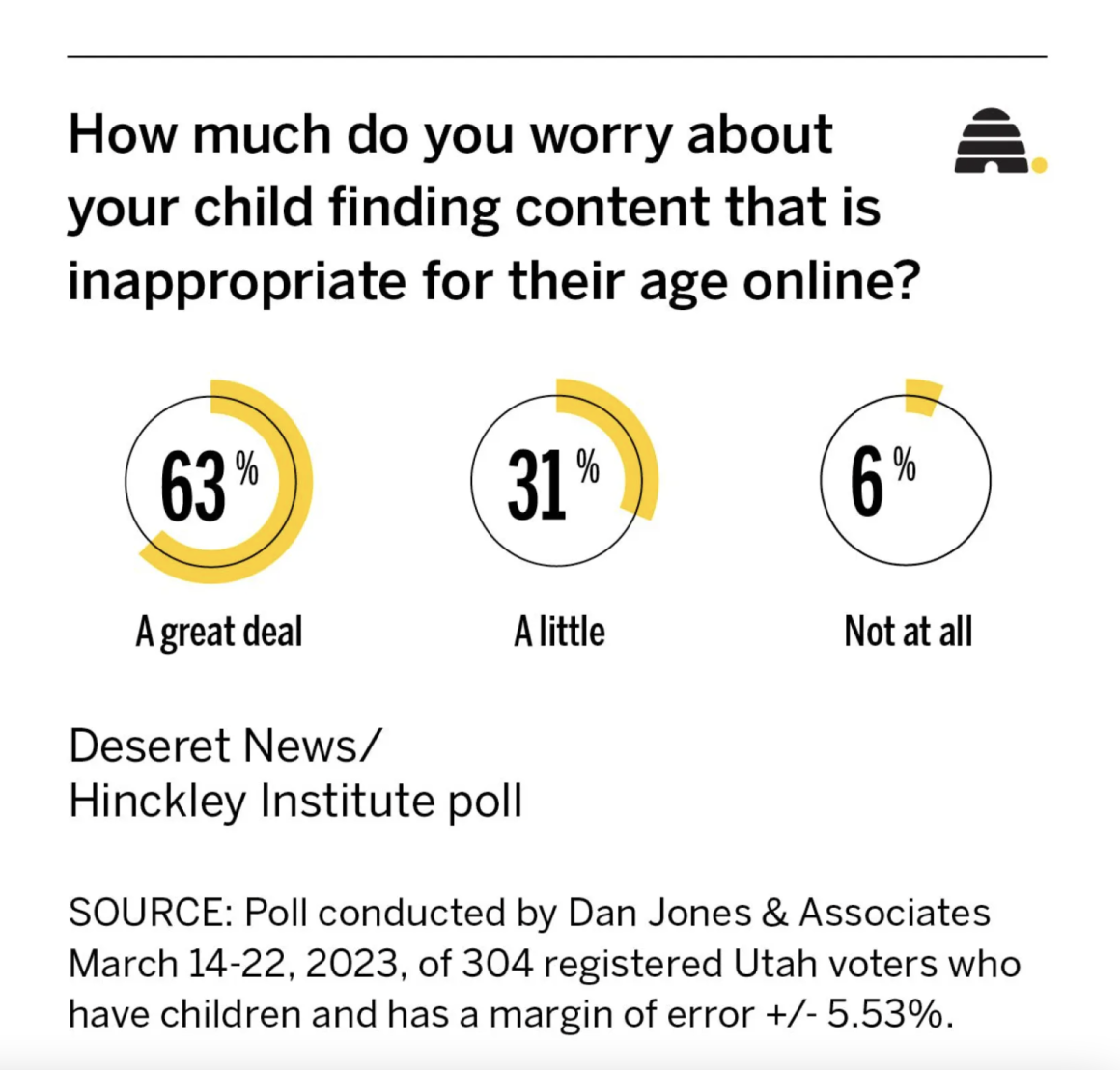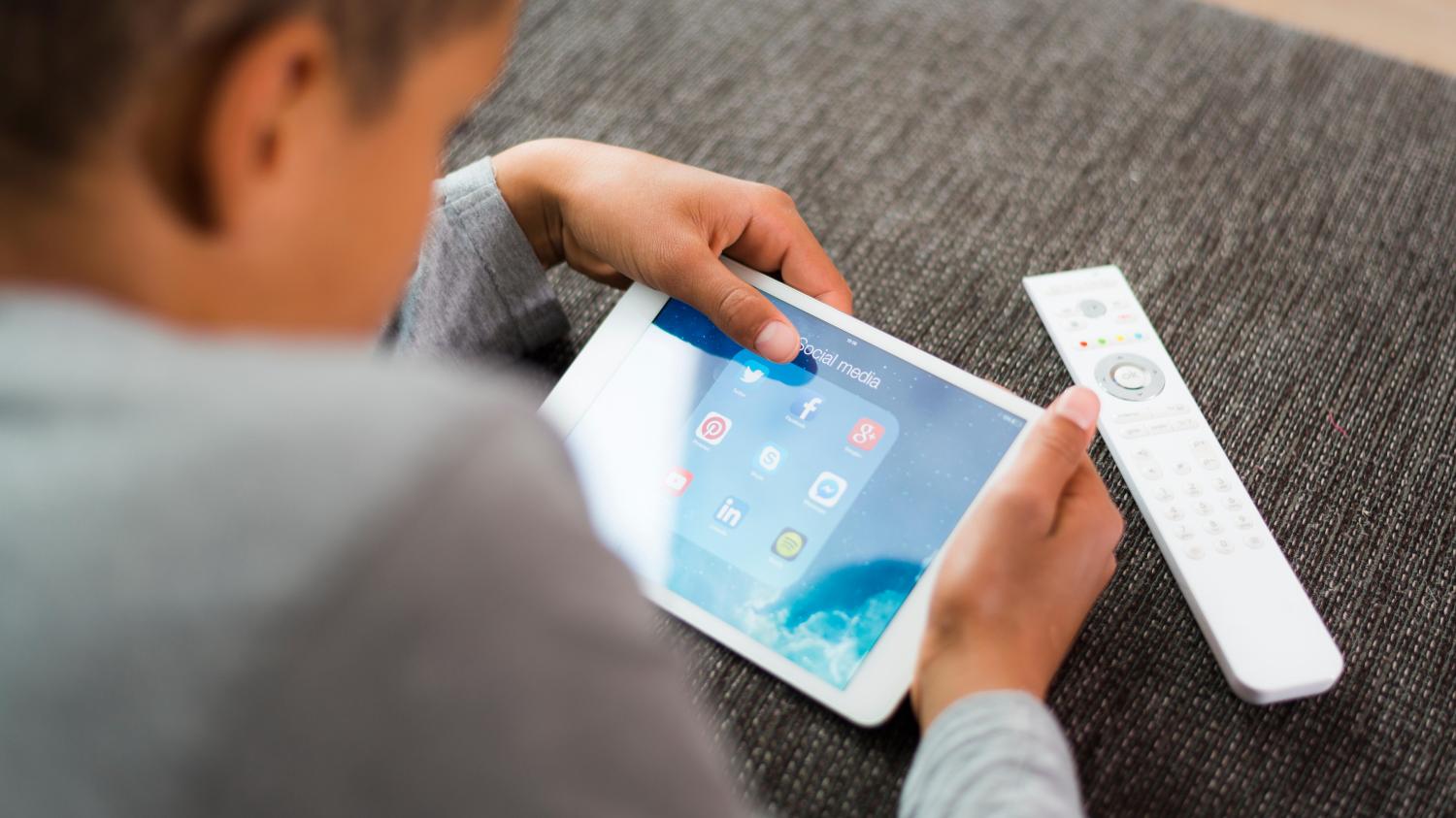The impact of social media on the mental health of children is a major concern.
Over 50% of parents believe that social media negatively impacts the moral and character development of their children, according to a poll conducted by Hinckley Institute of Politics, which said this has led to a growing desire among parents for less online content for their kids.
The poll asked 801 respondents on social media use, with only 8% saying children 13 or younger should have access to such content.
However, that doesn’t mean social media isn’t concerning to the subset of 312 parents in the survey with school-age children. The vast majority of those parents said they are worried their child could encounter inappropriate content online, with 63% concerned “a great deal” and 31% “a little.”
Even more were concerned their minor children might find sexually explicit content online, with 68% saying they worry “a great deal” and 31% answering “a little.” Just 6% said they were not worried about sexual content.

Cause for Concerns
The American Psychological Association (APA) recently released a set of guidelines on social media use for children, urging parents to limit the content their kids are exposed to on platforms such as TikTok, Facebook, and Instagram.
The APA also recommends parents take a multi-pronged approach to social media management, including time limits, parental monitoring and supervision, as well as ongoing discussions about social media.
The impact of social media on the mental health of children is another major concern.
A recent article in NBC Boston highlights the potential negative effects of technology and screen time on developing minds. The article suggests that parents and caregivers should be aware of the impact of social media on the mental health of children and take appropriate steps to protect them.
Research has also found that social media use can have distinct neural patterns in the brains of children as young as 12 who habitually check social media. This suggests that social media can have a lasting impact on the developing brain, further emphasising the need for parents to monitor and limit their children’s social media use.
While social media can provide an excellent way for young people to meet people, attend events, create and network, it may also deny them the chance to interact organically. In response, some parents are questioning whether their kids should be on social media at all, and if so, starting at what age.
Utah takes action
The recent interest in social media restriction debate comes in play as US attempts to alienate social media giants Tiktok in what some believe is a politically motivated play. Regardless, Utah state recently signed bills that makes anyone under 18 years old from using social media without express permission from a parent or guardian.
Between March 14-22, 801 registered Utah voters were asked at what age minors should be able to use social media. About 33% said at 14 to 15 years old, while 36% said 16 to 17.
Supporters like University of Virginia sociologist Brad Wilcox laud Utah’s new rules — and say the poll shows public support, too.
Coyne would like to see lawmakers take a “careful, thoughtful, nuanced look at the research and pass bills that would help all teenagers — “something like putting money into media literacy education from a very young age that helps our children learn how to thrive in their media world instead of just trying to shield them from it,” she said.
Social media, she said, is a tool. And like any tool, it can be used to good or bad effect. She points out that a hammer could kill someone — or build a house.
Coyne believes social media’s effect on individuals involves many factors, including their personality, experiences, current social situation and history. What they’re viewing on social media matters, as does with whom they communicate, when and the type of media used.
Real Risks
The case of Alexis Spence, who hid her Instagram account from her parents when she was 11 has recently taken storm. Spence, now 20, alleges in a lawsuit against Meta that social media use contributed to addiction to the app, depression, self-harm, an eating disorder and suicidal thoughts.
Her parents did everything they were supposed to, from having conversations to restricting use, Twenge said. Spence still got an account.
Another challenge, Spence said, is that school-owned computers used by some students don’t allow parental controls.
On June 6, with the help of the Social Media Victims Law Center, Spence filed a lawsuit against Meta Platforms (formerly known as Facebook), as the parent company of Instagram, alleging that Instagram’s design caused these mental and physical harms.
Similar lawsuits have failed in the past, mostly because social media platforms claim immunity under Section 230 of the Communications Decency Act. However, Spence’s lawsuit could turn out different.
Explicit content
Social media apps can also be a place where adult strangers contact minors.
“Sometimes those conversations can be very inappropriate,” Twenge told Deseret News including sending explicit pictures. She said some of TikTok’s so-called challenges can be dangerous, too.
Though the sites say they take down inappropriate material, Twenge said her experience consulting on lawsuits suggests it sometimes takes years to get material removed.
The age limits themselves pose a problem, according to Twenge, because they’re not verified. She’s happy Utah is tackling that. A child can check a box, lie about the birthdate and “boom, you have an account. A 7-year-old can do it — and we know that has happened.”
On the other hand, critics of the bills, including some civil rights groups and advocacy groups aligned with tech companies, say the proposals could threaten teens’ online privacy and prevent them from accessing content that could help them, such as resources for those considering suicide.







